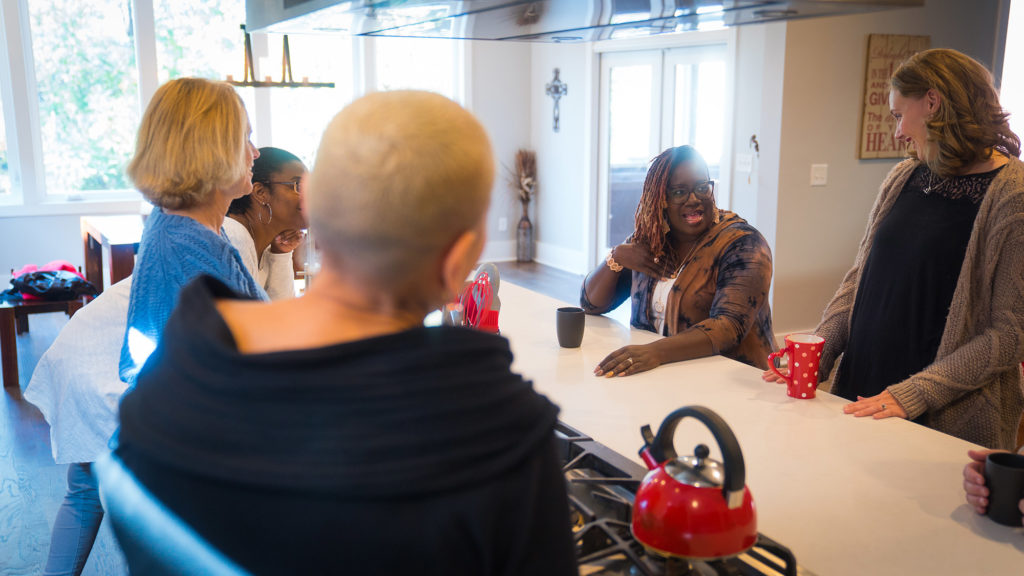The topic of racial solidarity is by no means a new one.
It is heavily discussed among minority evangelicals, from Anthony Bradley to Lecrae, and has been for years. In a recent article by Christianity Today, Christena Cleveland, pleads for her white brothers and sisters in Christ to “stand in solidarity with [their] black brothers and sisters”, and I applaud her for it. However, even as mainstream evangelicalism seeks to bolster their efforts in this issue, the discourse and debates surrounding this topic is still largely dominated by men.
My plea follows on the heels of Dr. Cleveland, but is directed now to us, as women: Ladies, it’s time to step up our game!
Now, don’t get me wrong. I’m not saying that there’s a problem with Christian men talking about racial solidarity. In fact, they should be talking about this very important biblical topic. But, at the same time, Christian women should not be excusing themselves from the table either.
The pursuit of racial solidarity is just as important for women as it is for men.
“Why?” you might ask. Simple: Because Jesus’ command in Matthew 22:37-39 (love the Lord your God with all your heart, soul, and mind, and love your neighbor as yourself), was directed to both men and women. Racial solidarity begins with a true, gospel-rooted love for one’s neighbor, and women must be just as involved, engaged, and proactive in this call as their brothers in Christ.
Now, before I list three steps women can take to advance racial solidarity, let me first provide a brief definition of the term. Anthony Bradley states it best: Racial solidarity is the pursuit of “racial diversity and multi-ethnicity … on the basis of the fact that we are all made in the image and likeness of God.” In other words, our pursuit of racial solidarity stems from our belief in the Imago Dei for every human being, regardless of skin color, ethnicity, or heritage, and it thus celebrates all peoples as a reflection of God himself.
Racial solidarity means that we don’t try to change people to be more like us; rather we allow ourselves to be taught by the other so we can better understand (and, more important, appreciate!) how they think, act, and feel. It means we don’t criticize, minimize, or make fun of racial differences. It means we don’t exclude the other or create divisions between ethnic people in which we try to exert our class, power, authority, or notions of leadership over them.
Now, that being said, here are three ways you can begin living that out today:
Listen more
First, we, as women, need to stop talking about ourselves so much and start hearing other people’s stories.
This may sound harsh, but please hear me: You have no right to judge people you know nothing about. Seeing a glimpse of one African American on the nightly news does not make you an expert on the black community. I know conservative evangelicals who have never had an African American friend in their lives, yet after watching a segment on Fox news about more gang violence in Chicago, will unashamedly talk about the “problem of black people” in our country. That sort of talk makes me sick.
God does not show us such lavish, daily grace just so we can turn around and harshly judge, berate, and abuse our neighbor (think of the Parable of the Unforgiving Debtor in Matthew 18:21-35). I’m also not saying that we ever see a minority brother or sister as someone in debt to us — that is racism at its finest.
No, what I am saying is that you need to start making some minority friends (perhaps your neighbors, your coworkers, or even the people in the pew behind you). Go their house and get to know them. Ask them what they like to do, what sort of foods they eat, what kind of holidays they celebrate, and (especially) what their view is on the state of race relations in our country. If you can not only listen, but also care and empathize, you are setting yourself on the path toward racial solidarity.
Learn more
Second, be avid readers.
I’m sorry (but not sorry): Stop reading those Amish love stories and start picking up some good history books. Truly, know your history. Educate yourself to the history of racism in our country so you are not ignorantly turning a blind eye to the problems of today. God gave us brains as well as hearts. Use them!
For example, read the writings of African Americans authors both past and present, from the memoirs of Harriet Tubman to Martin Luther King Jr. and even Malcolm X to the fictional writings of Alex Haley, Alice Walker, and Toni Morrison. Follow minority journalists and correspondents like Ta-Nehisi Coates. You may not always agree, or even like, what they say, but there is something to be said about Christians being “quick to listen, slow to speak and slow to anger” (James 1:19).
As a minority woman myself, I am tired of my white sisters making uninformed statements about their fellow minorities that, quite honestly, sound horribly racist. I know you don’t always intend to sound that way, but please educate yourself to the real history of racism in our country so that both your thinking and your language on the subject may be peppered with grace and humility.
Love more
Finally, respond in love to all you hear and read. It does no good just to know more, if you don’t respond with empathy and humility. It does no good to hear the painful stories of others, if you fail to connect their narrative to your own life.
This is where Christian activism plays a role, and one that I would love to see more Christian women participating in. Let us take to heart God’s command in Deuteronomy 6:4-11, where He exhorts us to literally talk about Him everywhere: in our home, on our streets, and elsewhere. All that we own, all that we do, and all that we say should testify to our love for God and, by extension, our neighbor.
I believe the way this translates for us today is this: Let us be advocates to our own children, to the women in our churches, and the people in our communities for racial solidarity. Proclaim the gospel of racial solidarity on social media — not just the biblical ideal of the Imago Dei — but also be courageous enough to lovingly stand up against injustices that you see and read in posts from others. Make racial solidarity a focal point of conversation with your friends and coworkers. Even make a plea for it in your local schools and organizations. Our love must be active, amen?
If we do this, women, I guarantee the world will not know what’s about to hit them. The pursuit of racial solidarity is a powerful tool in the advancement of the kingdom of God. I can promise you that.
Published March 21, 2018



